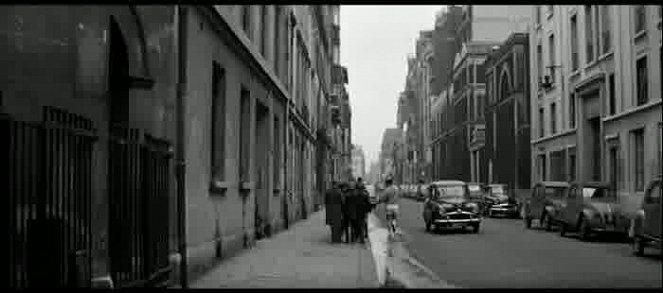Director:
François TruffautCámara:
Henri DecaëMúsica:
Jean ConstantinReparto:
Jean-Pierre Léaud, Claire Maurier, Guy Decomble, Albert Rémy, François Truffaut, Jean-Claude Brialy, Georges Flamant, Jeanne Moreau, Jacques Demy (más)Sinopsis(1)
Antoine Doinel es un muchacho de 12 años que vive en París como un solitario en su propia casa. El niño nació sin ser deseado y respira esta hostilidad constantemente, debiendo encajar, uno tras otro, los golpes que la vida le va dando, sintiéndose cada vez más incomprendido y desgraciado. (Movistar+)
Reseñas (5)
A lot of films have been made about how adults don’t understand their children and vice versa. However, few films about intergenerational misunderstanding have been “written” with such sympathy for rebellious young adolescents (perhaps not even Truffaut’s short The Mischief Makers and Vigo’s Zero for Conduct, which is directly quoted in The 400 Blows), and probably none is such a beautiful paean to film and its use as a means of “escapism”. The scene in which Antoine, in a large rotating drum (which not incidentally resemble a zoetrope), untethers himself from the ground, or rather from reality, must be moving for every cinephile (for whose pleasure the film also features a cameo by Jeanne Moreau as the lady with a dog). ___ The fact that Truffaut himself spent part of his childhood in a juvenile detention centre as punishment for his misbehaviour makes The 400 Blows (in French: Les Quatre cents coups, part of an idiom that could be loosely translated as “making mischief”) a film of a very personal nature with a psychotherapeutic dimension. Like Antoine, little Francois immersed himself in films and literature to escape from his dysfunctional family environment. It’s no wonder that he was later so glad to describe himself as the adopted son of André Bazin (to whom the film is dedicated), who saved him from the military prison where the anti-authoritarian Truffaut was locked up for desertion. ___ Truffaut never even met his biological father and the story of the film involves the search for the missing authority figure, a person who would have empathy for the boy and whom the boy could respect in turn. The mother, to whom the boy is connected by an oedipal bond, shows more emotional warmth to her lover. The betrayed father is unable to establish order and assert his own opinion. ___ Just as the adult characters are not one-dimensional caricatures, Truffaut’s understanding for the protagonist does not slide into uncritical sentimentality. Antoine is not blameless, which is made abundantly clear by his answers during his interview with the psychologist. The style of the film does not romanticise the situation. On the one hand, the shot composition stands out for its consistent sophistication (the alternation of confined interiors and liberating exteriors is emphasised by the widescreen Dyaliscope format), while the filming of everyday tasks is reminiscent of a neorealist attempt to capture the immediacy of the given moment. The result rings true above all. 85%
()
Truffaut's mastery is already on display in this film more than once, but it would only come out in all its glory in later films. PS: Am I the only one who thought that Paris was so visually and atmospherically reminiscent of old Žižkov?
()
I was expecting a pleasant spectacle, excited by the previous films of the cycle about the fate of Antoine Doinel. However, I was shocked by the concentrated depression that fell on me while watching the introductory part of the pentalogy. While the subsequent films have a slightly ironic mocking style, the first part of the series is actually a harsh psychological drama about the difficult childhood of a boy who was born as an unwanted child to a selfish mother who prioritizes her own goals and sees her son as an obstacle. Little Doinel feels limited not only at home but also in an authoritarian school, and on top of that, puberty affects him, so he cannot avoid issues that have fateful consequences. Just like in Truffaut's other films, autobiographical elements also appear here, and in addition to his own adventures during adolescence, he draws inspiration from the fate of his classmate Robert Lachenaye. What is essential is that Truffaut never pushes too hard and although his film is oppressive, it is also strongly realistic, never needing to resort to any scripted gimmicks or cheap emotional blackmail. It quietly heads toward its goal, but the small tricks and lies of the boy with a fertile imagination gradually accumulate and evoke harsh reactions from an intolerant environment, so the film inevitability moves toward a dark ending. For me, it is an exceptionally powerful emotional work that I give a 100% rating. The best film by Truffaut, and made at a very young age.
()
The French New Wave in all its glory – autobiographical elements and Truffaut's life experiences, melancholic cinematography capturing the bleak streets of Paris, a keen sense of correct composition, childlike instincts and gentle humour. Although the protagonist is not exactly the epitome of likeability and behaves like a spoiled brat, we understand his needs and we’re interested in how his fate will unfold. It seemed to me that at times Truffaut gets bogged down in symbolism and his own ambitions, making the story feel a bit lengthy, but its message and visual beauty are all the more essential and deservedly significant...
()
It can be, as a significant film in terms of French and maybe even world cinematography, but it left me rather indifferent. Yes, there are good scenes, but overall, it is still a film about how some people have a tough time. There is still something in life, something worth it. And I simply disagree with the notion that a person should only make films about what they have personally experienced.
()

